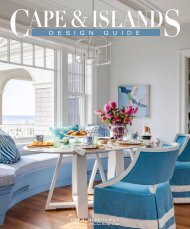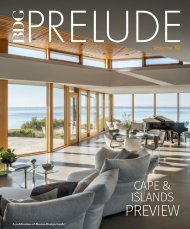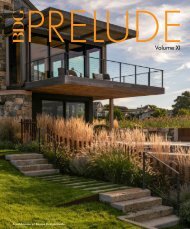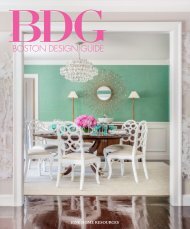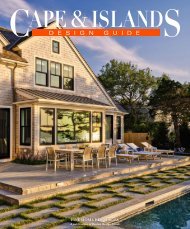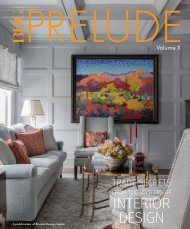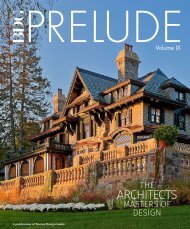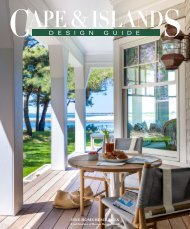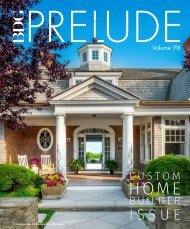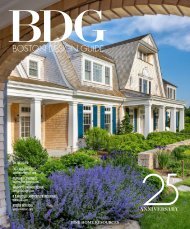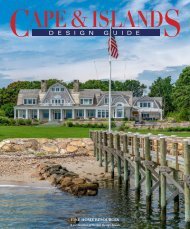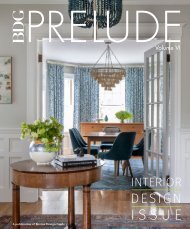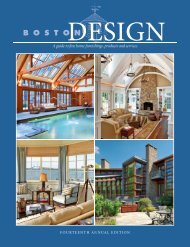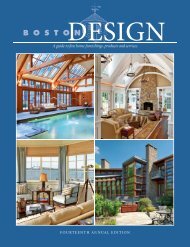BDG23 PRELUDE Fall 2019
BDG | Boston Design Guide Edition 2019 is your Luxury Home Resource Guide for products, services and design inspiration for the fine home.
BDG | Boston Design Guide Edition 2019 is your Luxury Home Resource Guide for products, services and design inspiration for the fine home.
Create successful ePaper yourself
Turn your PDF publications into a flip-book with our unique Google optimized e-Paper software.
Mark Doughty is President of Thoughtforms and an alumni liaison for the<br />
MIT Sloan Sustainability Initiative, which focuses on developing and empowering<br />
leaders to act so that humans and nature can thrive for generations<br />
to come. He lives with his family in an all-electric home that generates 70%<br />
more energy than it uses—enough to power a Tesla for 35,000 miles a year.<br />
With all the complexity that can tangle up our modern<br />
lives, the idea of a fresh, luxurious home can be just<br />
the right tonic to brighten a day. That idea, like so<br />
many that flourish in social and traditional media, is<br />
quite seductive. It’s no wonder, then, that people react<br />
strongly when a contrary thought intrudes. But perhaps<br />
it is time to welcome just such a contrary thought as<br />
motivation to pause and reflect on our definition of<br />
the ideal home, in the context of our families and the<br />
broader community.<br />
This past summer, the Town of Brookline proposed a<br />
bylaw that requires all new buildings and gut renovations<br />
to be free of fossil fuel infrastructure.<br />
The proposal was met by some with<br />
grumbling about “big government,”<br />
a reaction that seems more soundbite<br />
reflex than thoughtful response:<br />
after all, the town isn’t all that big and,<br />
at this local level of our democracy,<br />
an engaged citizenry can have a<br />
major influence on the direction<br />
of government. So, rather than<br />
the expressed fear of government<br />
infringement on our freedom, the<br />
source of opposition is more likely the<br />
judgment implied in the proposal—i.e.<br />
“what you’ve been doing all along is<br />
not good”—and fear of change. It is<br />
indeed unsettling to think that the path<br />
we have been obediently following in<br />
homebuilding for a century might be<br />
taking us to the wrong destination.<br />
But, objectively, how much of a course correction does<br />
a move away from fossil fuel imply? Thoughtforms<br />
has built all-electric homes without any observed cost<br />
penalties. The indoor climate in these homes is healthy<br />
and comfortable. The systems themselves are reliable<br />
(which is not surprising—the electric-powered heat pump<br />
was introduced in the 1940’s, 20 or so years after the gasfired<br />
furnace was patented). Perhaps most importantly,<br />
clients who live in these homes are happy with their<br />
homes—in some cases happier than those in fossil fuelfueled<br />
homes.<br />
CONSTRUCTION,<br />
CLIMATE AND<br />
THE POSSIBILITY<br />
OF A FUTURE<br />
Given all this, a bylaw that takes fossil fuel systems out<br />
of the mix seems a matter of substitution rather than an<br />
abrupt detour onto a costly, risk-fraught path. So why isn’t<br />
everyone on board? Inertia.<br />
It’s quite easy to go through each day doing essentially<br />
what we did the day before, expecting similar, predictable<br />
results. Unfortunately, this “business as usual” approach<br />
no longer promises predictable results and is putting our<br />
collective future at risk (read Kerry Emanuel’s What We<br />
Know About Climate Change for a concise review of the<br />
crisis and possible mitigating actions—contact me and<br />
I can send you a copy). If we think of our ideal home in<br />
this context of society and survival,<br />
in-home fossil fuel infrastructure<br />
compounds the problem: while it<br />
may be possible through collective<br />
action to convert the shared electric<br />
grid to fossil fuel-free sources, it will<br />
be much more challenging to convert<br />
infrastructure in every individual home.<br />
Given this reality, and where we are<br />
situated in time, place and opportunity,<br />
building more homes with on-site<br />
fossil fuel infrastructure simply seems<br />
absurd. We are already in a hole and<br />
this proposal tells us: “Stop digging!”<br />
It’s hard to find a builder that doesn’t<br />
profess their commitment to quality.<br />
But how many limit their definition<br />
of quality to the traditional attributes<br />
of craftsmanship and beauty? True<br />
quality includes the health of the<br />
home environment, the lifecycle impact of the home<br />
on our world, and the physical and emotional well<br />
being of the families who live, learn and grow in the<br />
home. As a community, we should invest our time and<br />
resources building homes that make it possible for future<br />
generations to thrive.<br />
Author, educator and environmentalist Bill McKibben<br />
put it aptly when he said, “The problem with climate<br />
change is that it’s a timed test. If you don’t solve it fast,<br />
then you don’t solve it.” This is our opportunity to<br />
contribute to the solution.<br />
64<br />
bostondesignguide.com



